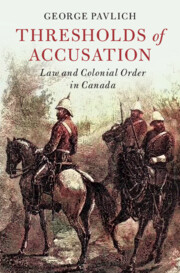Book contents
- Thresholds of Accusation
- Cambridge Historical Studies in American Law and Society
- Thresholds of Accusation
- Copyright page
- Dedication
- Contents
- Figures
- Preface
- Acknowledgements
- 1 Grammars of Critique and Colonial Accusation
- 2 Reconnaissance Discourses for Colonial Law
- 3 Sovereign Spectacles and Criminal Accusation
- 4 Justices of the Peace at Accusatory Theatres
- 5 Training Police Accusers
- 6 Moulding Accused Individuals
- 7 Biopolitics and Colonial Accusation
- 8 Denouements and Turned Spades
- References
- Index
6 - Moulding Accused Individuals
Published online by Cambridge University Press: 14 September 2023
- Thresholds of Accusation
- Cambridge Historical Studies in American Law and Society
- Thresholds of Accusation
- Copyright page
- Dedication
- Contents
- Figures
- Preface
- Acknowledgements
- 1 Grammars of Critique and Colonial Accusation
- 2 Reconnaissance Discourses for Colonial Law
- 3 Sovereign Spectacles and Criminal Accusation
- 4 Justices of the Peace at Accusatory Theatres
- 5 Training Police Accusers
- 6 Moulding Accused Individuals
- 7 Biopolitics and Colonial Accusation
- 8 Denouements and Turned Spades
- References
- Index
Summary
Following an analysis of key colonial accusers, Chapter six focuses attention on the target of Alberta’s performances at theatres of accusation: criminally accused individuals. It reveals a politics through which accused subjects were formed at police-guided accusatory theatres – including information gathering, arrest, and examination. These theatres required targeted subjects to perform roles, under the threat of force, as law’s accused persons. Referring to three paradigmatic examples, the discussion centres on how colonial law recognized criminally culpable individuals. Underscoring individually based accusations, this law moulded accused personas through at least two key techniques. First, its justices transcribed what could be legally ‘heard’ and translated complex relations into idioms of law – thereby attributing degrees of culpability for crimes to accused individuals and deflecting attention away from conflict-generating social structures. Secondly, the theatres managed avowals of legal truth, thus subtly promoting obedience to colonial law and thence settler social order.
Keywords
- Type
- Chapter
- Information
- Thresholds of AccusationLaw and Colonial Order in Canada, pp. 143 - 165Publisher: Cambridge University PressPrint publication year: 2023



